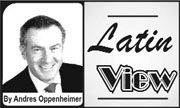Of all the reasons for concern about a potential Donald Trump administration’s foreign policy, one of the most troublesome — aside from Trump’s impulsive personality — would be the conflicts of interest posed by his investments abroad, and by his debts to foreign banks.
 There are many other reasons to worry, including the fact that Trump would be the Islamic State’s dream president — one who would unite the whole Muslim world against the United States — and the likelihood that key US allies might come to think that America has become a banana republic ruled by a clown, and could hold back their intelligence cooperation with Washington.
There are many other reasons to worry, including the fact that Trump would be the Islamic State’s dream president — one who would unite the whole Muslim world against the United States — and the likelihood that key US allies might come to think that America has become a banana republic ruled by a clown, and could hold back their intelligence cooperation with Washington.
But of all these potential problems, the most immediate one would be that the billionaire Republican candidate would be a greater target for foreign pressures than any other president in recent US history.
That’s because, unlike previous US presidents for the past five decades, he says he won’t set up a blind trust or convert his assets into conflict-free US government bonds. Instead, Trump says that if elected, he would turn over his business empire to his children, as if that would prevent any of the 22 countries in which he has hotels, golf courses and other investments from exerting pressure on his business empire, or using its business ties to ask for favours.
“I’ll have my children and executives run the company, and I wouldn’t discuss it with them,” Trump told Fox News on September 15. Yeah, sure! We are supposed to believe that over the four years of his possible presidency he would not discuss business matters with his children, who happen to be among his closest political advisers.
What’s worse, Trump is the first presidential candidate in many decades who refuses to release his tax records, citing the phony excuse that he is being audited. We know much more about Hillary Clinton and the Clinton Foundation’s finances, than about Trump’s.
Trump’s failure to disclose his tax returns keeps us from knowing whether he is lying blatantly when he claims that he has built a $10 billion fortune, although Bloomberg News puts it at $3 billion. More importantly, it leaves us in the dark about all the countries and foreign governments he is doing business with.
Last week, a group of 50 former Democratic and Republican foreign policy officials released a letter raising their concerns about the fact that “Donald Trump still has not revealed to the American public his international business relationships, even as it becomes increasingly clear that his overseas ties could well constitute significant conflicts of interest.”
When I read that letter, I couldn’t help thinking about some of Trump’s foreign policy statements in recent months.
Could it be that Trump said recently that he has “nothing but praise” for Turkey’s authoritarian president Recep Tayyip Erdogan because the Trump Organization inaugurated a $400 million Trump Towers Istanbul complex in that country four years ago?
Could it be that Trump repeatedly praises Russia’s de facto dictator Vladimir Putin because Russian oligarchs who may be close to Putin are among his best real estate clients? (Donald Trump Jr said at a 2008 real-estate conference that “Russians make up a pretty disproportionate cross-section of a lot of our assets,” and that “We see a lot of money pouring in from Russia,” according to The Washington Post.)
Could it be that Trump holds a personal grudge against Mexico — vowing to build a wall with Mexico and to slap a 35 per cent tax on Mexican imports — because his three-tower, 25-story luxury Trump Ocean Resort Baja Mexico project was a monumental failure? (The project was halted in 2009, two years after construction started, leaving a long trail of lawsuits.)
Granted, these are just questions, which may or may not indicate any personal financial motives behind Trump’s foreign policy stands.
But if Trump really wants to put this issue away — instead of insulting our intelligence by saying that if elected he would cut his ties with his business empire by handing it over to his children — he should release his tax records and vow to set up a blind trust. Otherwise, if he wins, we will never know whether he’s working for the country, or for himself.








